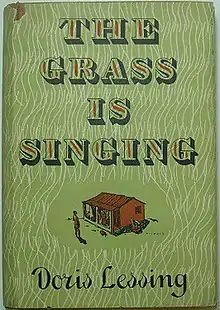The Grass Is Singing
The Grass Is Singing is the first novel, published in 1950, by British Nobel Prize-winning author Doris Lessing. It takes place in Southern Rhodesia (now Zimbabwe), in southern Africa, during the 1940s and deals with the racial politics between whites and blacks in that country (which was then a British Colony). The novel created a sensation when it was first published and became an instant success in Europe and the United States.
 First UK edition | |
| Author | Doris Lessing |
|---|---|
| Country | United Kingdom |
| Language | English |
| Publisher | Michael Joseph (UK) Thomas Y. Crowell Co. (US) |
Publication date | 1950 |
| Media type | Print (hardback & paperback) |
| Pages | 256 |
The novel begins with a newspaper clipping about the death of Mary Turner, a white woman, killed by her black servant, Moses. The bulk of the novel is the story of Mary's life.
After a loveless, wretched childhood, Mary is contented with her life as an office worker in a city in Rhodesia. But, after overhearing her friends laugh at her as sexless and immature, she resolves to marry, and when Dick Turner asks her she consents, though she has met him only twice. Dick is also in a hurry to wed, because he is very lonely and unhappy clawing a bare living from a subsistence farm and living in a bare, ugly little house. From the beginning, they are distant and cold, but, except when Mary briefly runs away, fear of loneliness and lack of money keep them together. When Mary becomes involved in the running of the farm, she realizes that its failure is not down to bad luck, as Dick keeps telling her, but his incompetence. This distances her even more from him. Their white neighbors make overtures of friendship, but, out of shame at her poverty, Mary rejects them. The Turners' barren existence is contrasted with the fierce beauty of the land, to which they are oblivious.
The natives, whom Dick employs on the farm, are a further source of tension. Black people have never been part of Mary's world, and she treats them with frigid contempt. They have difficulty keeping a servant until Dick assigns his best field hand, Moses, to the house. What he does not know is that the weal on Moses' face is there because Mary, enraged at what she considered insolence, struck him with a whip. As the farm deteriorates, the three of them are locked into an elaborate dance of intimacy, despair, and, finally, death.
Title, dedication, and introductory quotations
The title is a phrase from the fifteen lines of T. S. Eliot's The Waste Land quoted after the novel's dedication to a Mrs Gladys Maasdorp "of Southern Rhodesia, for whom I feel the greatest affection and admiration." Found on both lines 354 and 386 of Part V: 'What the Thunder Said', it is one of the more jubilant and reviving images used in that section, despite its theme of destruction's power over growth. Lessing also quotes an anonymous author: "It is by the failures and misfits of a civilization that one can best judge its weaknesses."
Adaptations
The book was adapted into a movie in 1981 by a Swedish company. Filmed in Zambia, the film stars John Thaw, Karen Black and John Kani in the lead roles. It is also known under the titles Gräset sjunger (Swedish) and Killing Heat.
Publication history
The first American edition was published in 1950 by Thomas Y. Crowell. The first American paperback edition was in 1964, from Ballantine Books.[1] The novel was also republished in 1973 in the influential Heinemann African Writers Series.
References
- The Grass Is Singing, Doris Lessing. New York: Ballantine Books U5015 (1964)